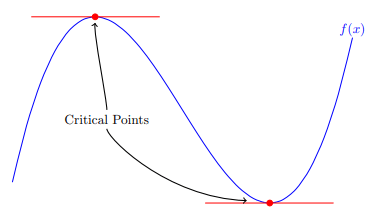FIND CRITICAL NUMBERS OF A FUNCTION
To find critical numbers, we have to use steps given below.
Step 1 :
Find the first derivative.
Step 2 :
Equate the first derivative to 0.
Step 3 :
Solve for the variable. From this, we can understand that slope will be zero at these positions.

Find any critical numbers of the function.
Problem 1 :
f(x) = x3 - 3x2
Solution :
f(x) = x3 - 3x2
f'(x) = 3x2 - 6x
3x2 - 6x = 0
3x(x - 2) = 0
3x = 0 and x - 2 = 0
x = 0 and x = 2
So, the critical numbers are x = 0 and x = 2.
Problem 2 :
g(x) = x4 - 4x2
Solution :
g(x) = x4 - 4x2
g'(x) = 4x3 - 8x
4x3 - 8x = 0
4x(x2 - 2) = 0
4x = 0 and x2 - 2 = 0
x = 0 and x2 = 2
x = ±√2
So, the critical numbers are x = ±√2.
Problem 3 :
g(t) = t√(4 - t), t < 3
Solution :
So, the critical numbers are t = 8/3.
Problem 4 :
Solution :
(x2 + 1)(4) - (4x)(2x) = 0
4x2 + 4 - 8x2 = 0
-4x2 + 4 = 0
-4(x2 - 1) = 0
x2 = 1
x = ±1
So, the critical numbers are x = 1 or -1.
Problem 5 :
h(x) = sin2x + cos x
0 < x < 2π
Solution :
h(x) = sin2x + cos x
h'(x) = 2 sin x cos x - sin x
h'(x) = 0
2 sin x cos x - sin x = 0
sin x(2 cos x - 1) = 0
If we solve we get,
sin x = 0 and 2 cos x - 1 = 0
x = 0 and 2 cos x = 1
cos x = 1/2
The cos of the function is positive. General solution for the cosine function
x = 2nπ ± θ where θ ∈ (0, π]
For π/3,
|
n = 0 x = π/3 |
n = 1 x = 2π + π/3 x = 7π/3 ∉ (0, π] |
n = 1 x = 2π - π/3 x = 5π/3 ∈ (0, π] |
So, the critical numbers is x = π/3, 5π/3.
Problem 6 :
f(θ) = 2 sec θ + tan θ
0 < θ < 2π
Solution :
f(θ) = 2 sec θ + tan θ
f'(θ) = 2 sec θ tan θ + sec2θ
f'(θ) = 0
2 sec θ tan θ + sec2θ = 0
2 sin θ + 1 = 0
sin θ = -1/2
The sin of the function is negative .
So, theta is third and fourth quadrant.
Hence, the interval 0 < θ < 2π.
So, the critical numbers is θ = 7π/6, 11π/6.
Recent Articles
-
Finding Range of Values Inequality Problems
May 21, 24 08:51 PM
Finding Range of Values Inequality Problems -
Solving Two Step Inequality Word Problems
May 21, 24 08:51 AM
Solving Two Step Inequality Word Problems -
Exponential Function Context and Data Modeling
May 20, 24 10:45 PM
Exponential Function Context and Data Modeling